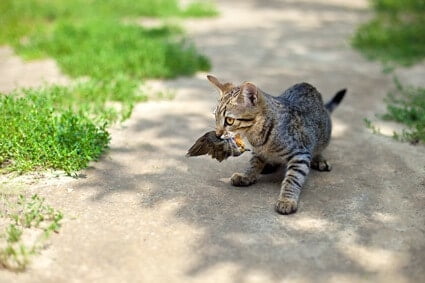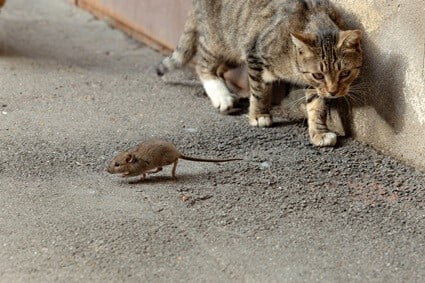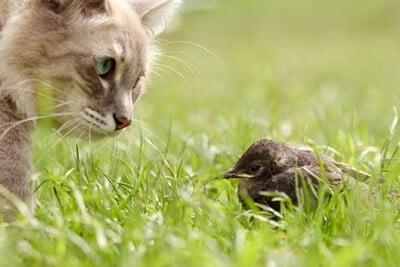Cats are instinctual hunters and may bring home small prey, such as rodents (mice and rats) and birds. Usually, cats bring home dead animals, but a cat may return with live prey to teach its young how to hunt. Fortunately, you can prevent your cat from bringing home wildlife.
A bell on your cat’s collar can reduce the predation of birds, mice, and other small mammals. Feeding your cat a protein-rich diet will mean that it stays closer to the home and away from prey animals. Channeling your cat’s hunting skills through play that involves chasing, pouncing, and pawing can also curb a cat’s hunting instincts.
Seeing your cat bring home its gory catch can be disturbing. Don’t make a fuss about it, and offer your pet a catnip-filled toy instead. When it’s not looking, safely dispose of the dead animal and introduce some preventive techniques.
How to Prevent Cats from Bringing Home Live And Dead Animals
There are many reasons cats bring home dead (and sometimes live) prey, such as mice, rats, birds, snakes, and lizards. These include:
- The cat is bringing its owner a gift in return for the food they provided
- Cats with kittens may bring home partially live prey to teach their young how to hunt
- Your cat may want a safe, quiet place to eat its hard-won meal later
According to the journal Nature, free-roaming cats kill an estimated 1 to 4 billion birds and 6 to 22 billion small mammals annually in the United States.
Regardless of the reason, dead mice and birds being brought inside the house can be distressing, and it’s definitely unhygienic. Some owners are also concerned about their cat’s impact on wildlife.
Belled Collar
According to Wildlife Research, putting a belled collar on cats reduced the predation of birds by 50% and the predation of rodents by 61%.
A further study by the RSBP found that cats that wore a belled collar came home with 41% fewer birds and 34% fewer mammals than cats that wore a plain collar. The study also used an electronic sonic device on cats. Results showed cats equipped with this device killed 51% and 38% fewer birds and mammals than cats with a plain collar.
Sonic collars may prevent your cat from catching their prey as it alerts the animal about your cat’s presence. However, experts aren’t certain about the effectiveness of these collars or their effect on the cat’s health. Ensure that the collar is fitted correctly and has a quick-release mechanism that snaps open if it gets snagged on a fence or branch.
Birdbesafe Collars
A study in Global Ecology and Conservation found that Birdbesafe collars reduced the predation of birds by free-roaming cats by 87%. These collars work by alerting birds from a distance through their bright and vibrant colors.
They may not be as effective at night, nor will they keep your cat from successfully hunting mice and other rodents. However, they may prevent your cat from hunting lizards due to the structure of their eyes.
Cat Bib
A cat bib may curb your cat’s hunting instincts by interfering with its timing and coordination. According to research conducted by Biological Conservation, cat bibs reduced the predation of birds by cats by 81%, small mammals by 45%, and herpetofauna by 33%.
Attach the bib to your cat’s elastic or snap-open collar only before it goes outdoors. The bib will hang loosely over your cat’s chest.
Let Your Cat Out At The Right Times
Cats are extremely independent. It can be impossible to keep an eye on every move they make when outdoors. However, you can decide when your cat can leave the house and when it should stay indoors.
Birds are most vulnerable one hour before sunset and one hour after sunset, particularly during March-July and December-January. Birds come out and feed following bad weather, hence why some cats stay out during the rain. Therefore, keep your cat indoors during these times to reduce their chances of hunting birds.
Mice and rodents often roam around in the open in the night or when it is dark. Keep your cat indoors during night time to prevent it from capturing and bringing home rodents.

Protect Backyard Birds
If you have a bird table in your backyard, make sure it is tall and fitted on a pole. If the table is high enough, your cat won’t be able to reach it. Ideally, the bird table should be at least 6 feet above the ground. You can also spread Vaseline on the bird pole to deter your cat from climbing it.
Also, you can place your bird table in an open area, away from fences and trees that your cat can jump from. If the bird feeder is on a tree, place it on a weak branch that will break if your cat climbs on it.
Spay or Neuter your Cat
Cats that have been spayed or neutered are less likely to range far from home. This reduces the size of their territory and thus the number of prey animals that they bring home.
Another reason to neuter or spay your cat is that it keeps cat populations under control. This helps reduce predation of wildlife and the impact cats have on near-extinct birds and other animals.
Additional Play
Cats, no matter how domesticated they are, are unlikely to lose their natural instinct to hunt. Not being able to hunt increases a cat’s stress levels. You can counteract this and allow your cat to channel its hunting behavior through more acceptable activates.
Let your cat be the hunter while it is playing. Fishing rod-style toys can help you create the natural movements of a mouse. Allow your cat to stalk the pretend mouse and pounce on it. Other examples of hunting toys include plastic balls and sisal-wrapped toys that your cat can dig its claws into.
Cats also enjoy playing with shower curtain rings, paper balls, paper bags, and empty toilet paper tubes if you’re looking for something homemade. Just be sure to supervise your cat to prevent it from ingesting anything it shouldn’t eat, such as plastic bags. Playing with your cat for 30 minutes per day will fulfill your cat’s needs.
Let Your Cat Hunt for Its Food
Instead of letting your cat catch mice and birds, you can engage your cat’s predatory behavior by allowing it to search for its food. There are specialized toys that let you hide treats inside of them. Also, you could hide food around the house and let your cat sniff out its meal.
A puzzle or scatter feeder will provide your cat with small portions of meals while making it a fun game for your cat. You can make a scatter feeder at home using a clean empty plastic bottle. Cut out holes that are big enough to let food through but small enough to make it hard for your cat to get to them. Fill it a quarter way with treats and dry food, and let your cat knock and roll the feeder to get the food out.
Feed your Cat Raw Meat
Some owners believe that keeping their cats full will keep them from hunting outdoors. However, overfeeding is unhealthy and an ineffective way of curbing a cat’s hunting behavior.
A cat that is lacking in nutrients will look for a healthier meal someplace else. Since they’re carnivorous by nature, they’ll likely search for small animals, such as mice, birds, snakes, lizards, and insects.
Offer your cat a protein-rich diet. Fresh red meat will fulfill your cat’s nutrient requirements as it closely resembles a wild cat’s diet. This can help abate its need for sustenance from hunted wild prey.
Cats also enjoy stalking, pouncing, catching, and playing with their prey. When the opportunity presents itself, a cat will hunt for fun. You can keep your cat stimulated by playing with it indoors, offering it toys to play with, and hiding treats and kibble around the house.

Remove the Cat Flap
A cat flap reduces your control over when your cat can leave and enter the house. It also allows your cat to enter your home unsupervised at any time of the day and night. Although getting rid of its flap will not keep your cat from hunting birds and mice, it will prevent it from bringing dead animals into your home.
There are many anti-mouse cat flaps available, but removing the cat flap entirely will ensure no animals (dead or alive) enter the house. Having complete control over when your cat leaves the house will allow you only to let it out when birds and small mammals are least vulnerable.
If you let your cat out in the night, ensure that the porch or yard lights are on so that you can keep an eye on your cat. When letting your cat back inside, make sure you can see what’s inside its mouth. A cat can easily sneak in a small animal inside its mouth without the owner noticing, especially if it is dark.
Dispose of Dead Wildlife Quickly
Showing your cat that you don’t appreciate its gift by throwing it away immediately or showing that you’re angry will encourage your cat to bring home something better.
The chances are that your cat is trying to impress you by bringing home its catch. Seeing your disdain will only make it try harder and bring you a better catch next time. Creating a fuss when your cat brings home dead animals will cause it to associate its gifts with getting more attention. This, again, encourages it to continue bringing home dead animals.
If your cat brings home its prey, thank it and offer a catnip-stuffed toy in return. Dispose of the dead animal without any fuss when your cat is distracted by its toy. This will ensure that your cat forgets about its catch and associates the fun with its toy.
Keep Your Cat Indoors
Keeping your cat inside is the most effective way of stopping your cat from bringing home dead animals. If you’ve recently adopted a cat, consider keeping it indoors only. However, if you are keeping your cat inside, you will need to ensure that it is entertained and remains active.
Alternatively, you can use cat fencing to let your cat have some outdoor time. Fences will keep your cat from wandering further away from home and catching more birds and mice. However, small animals that enter your yard will still be at risk of being captured by your cat.

